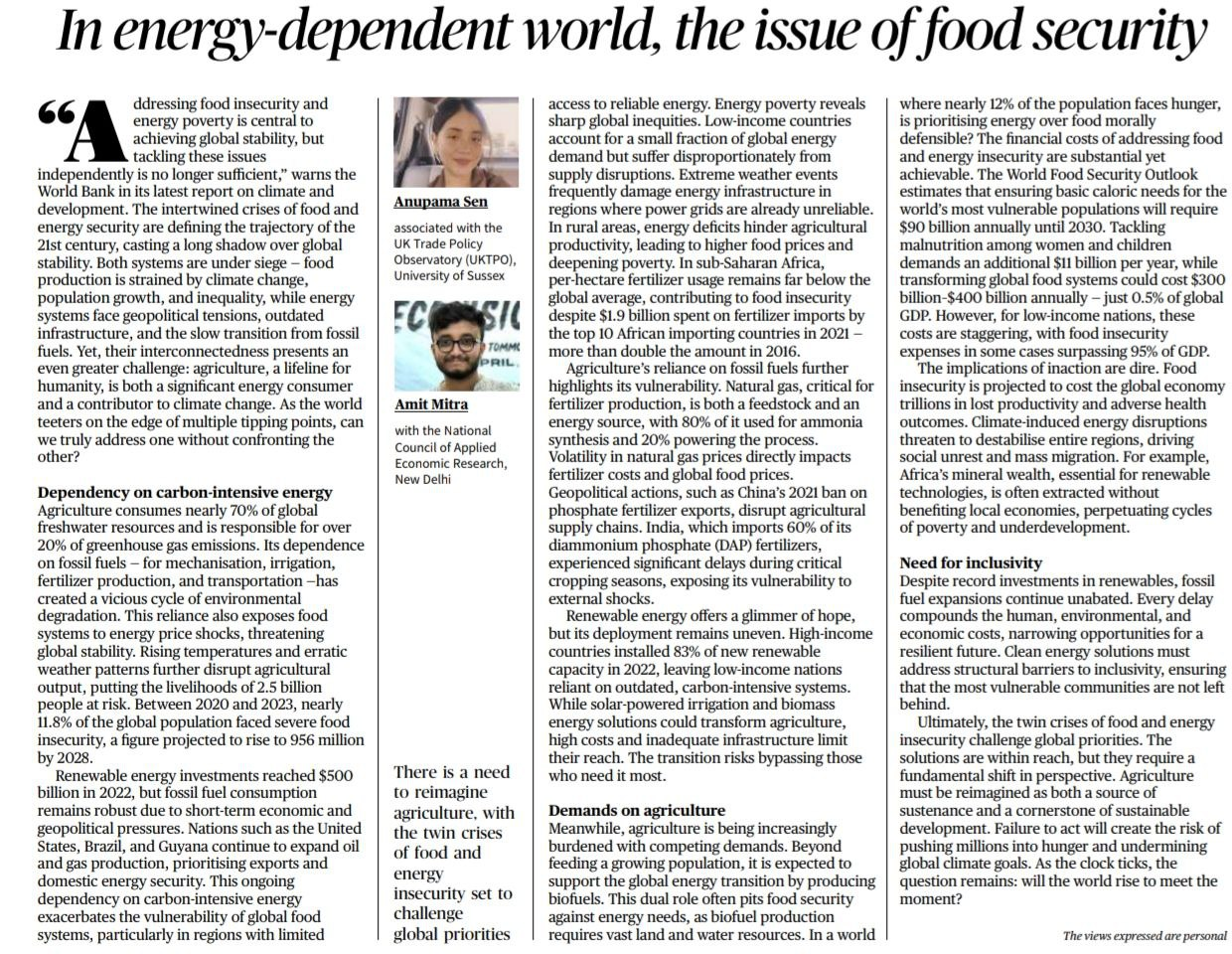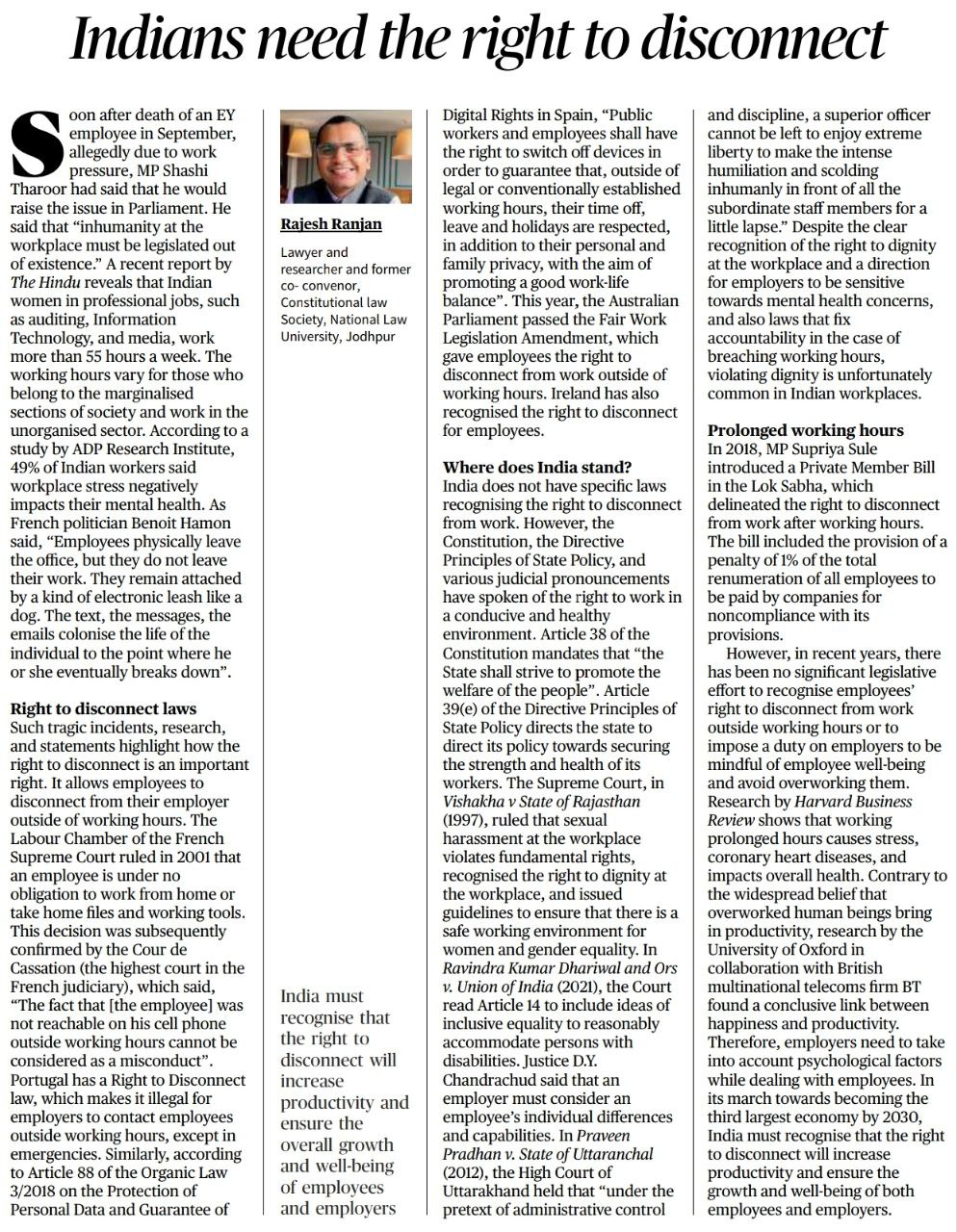1. Tackling Food Security in an Energy-Dependent World
Introduction
- Food insecurity and energy poverty are deeply interconnected challenges that threaten global stability.
- Agriculture, a critical sector for food production, is heavily dependent on fossil fuels, contributing to climate change while simultaneously being vulnerable to its impacts.
- Addressing these crises together is essential to create sustainable systems for future resilience.
- Dependency on Carbon-Intensive Energy:
- Agriculture’s Carbon Footprint:
- Consumes 70% of global freshwater and contributes 20% of greenhouse gas emissions.
- Dependence on fossil fuels for mechanization, irrigation, and fertilizers exacerbates environmental degradation.
- Energy Shocks:
- Rising temperatures and extreme weather threaten global food production, impacting 2.5 billion lives.
- Severe food insecurity affected 11.8% of the global population in 2022, projected to rise further.
- Food Security in Energy-Scarce Regions:
- Challenges in Low-Income Nations:
- Limited access to reliable energy disrupts agricultural productivity, causing high food prices.
- Sub-Saharan Africa spends $1.9 billion annually on fertilizer imports despite food insecurity.
- Impact of Global Supply Disruptions:
- Fertilizer shortages and fluctuating energy prices exacerbate vulnerabilities, increasing costs of production.
- Renewable Energy Investments:
- Investments in 2022 totaled $500 billion, but fossil fuel reliance persists due to geopolitical pressures.
- Clean energy systems can reduce agriculture’s reliance on fossil fuels, improving resilience.
- Need for Inclusivity in Renewable Expansion:
- Renewable expansion must benefit low-income nations to avoid perpetuating cycles of poverty.
- Inclusive energy transitions can uplift vulnerable populations, ensuring access to both energy and food.
- Reimagining Agriculture:
- Sustainable agricultural practices, such as biofuel production and natural fertilizers, reduce dependency on fossil fuels.
- Countries like China and India demonstrate policy measures to mitigate agricultural vulnerability, but further global efforts are required.
Conclusion
- The twin crises of food insecurity and energy poverty require integrated solutions.
- Promoting clean energy and sustainable agriculture must remain central to policies addressing global food security.
- With the right investments and collaborative efforts, these challenges can be tackled effectively, avoiding the catastrophic risks of inaction.
Practice Question for Mains (GS-III): |
1. Question: “Food security and energy poverty are interlinked global challenges. Discuss the role of renewable energy and sustainable agriculture in addressing these crises. Suggest measures for inclusive development.” (250 words) |
2. Need of the Right to Disconnect
Introduction
- In an era of increasing work pressure and extended working hours, the lack of boundaries between professional and personal life has led to adverse effects on employees’ mental and physical well-being.
- Globally, the “Right to Disconnect” is gaining attention as a mechanism to ensure work-life balance and dignity in the workplace.
- Current Scenario in India:
- Workplace Challenges:
- Indian workers, especially women and marginalized sections, face long working hours, often exceeding 55 hours per week.
- A survey by the ADP Research Institute revealed that 49% of Indian workers report negative impacts on mental health due to work pressures.
- Lack of Legislative Framework:
- No specific legal provisions in India guarantee employees the right to disconnect from work outside official hours.
- A Private Member Bill in 2018 by Supriya Sule highlighted the need for such legislation but did not materialize.
- Global Perspective:
- France:
- The Labour Code mandates that employees are not obligated to answer calls or emails outside work hours, ensuring clear boundaries.
- Portugal:
- Employers are prohibited from contacting employees outside official hours except in emergencies.
- Spain and Ireland:
- Both countries have recognized the right to disconnect, promoting work-life balance and mental health.
- Legal and Policy Considerations for India:
- Constitutional Provisions:
- Article 38 directs the state to minimize inequalities and promote welfare.
- Article 39(e) emphasizes the protection of workers’ health and strength.
- Judicial Precedents:
- Vishaka v. State of Rajasthan (1997): Recognized dignity at the workplace and safe working conditions for women.
- Ravindra Kumar Dhariwal v. Union of India (2021): Advocated reasonable accommodation for persons with disabilities.
- Impacts of Overwork:
- Mental and Physical Health:
- Prolonged working hours increase stress, heart disease, and other illnesses.
- Productivity and Happiness:
- Studies show a positive correlation between work-life balance and overall productivity.
- Way Forward:
- India should adopt legislation similar to global models, recognizing the right to disconnect to protect employees’ mental health.
- Employers must foster a culture that respects work-life boundaries and prioritizes employee well-being.
- Strong legal frameworks should hold companies accountable for violations of working hour norms.
Conclusion
- Recognizing the “Right to Disconnect” is crucial in creating a balanced work environment that prioritizes mental and physical health.
- India, on its path to becoming the world’s third-largest economy, must address these issues to ensure sustainable development and well-being for its workforce.
Practice Question for Mains (GS-II): |
Question: “Discuss the significance of the ‘Right to Disconnect’ in ensuring work-life balance and dignity at the workplace. What steps should India take to implement this concept effectively?” (250 words)
|



